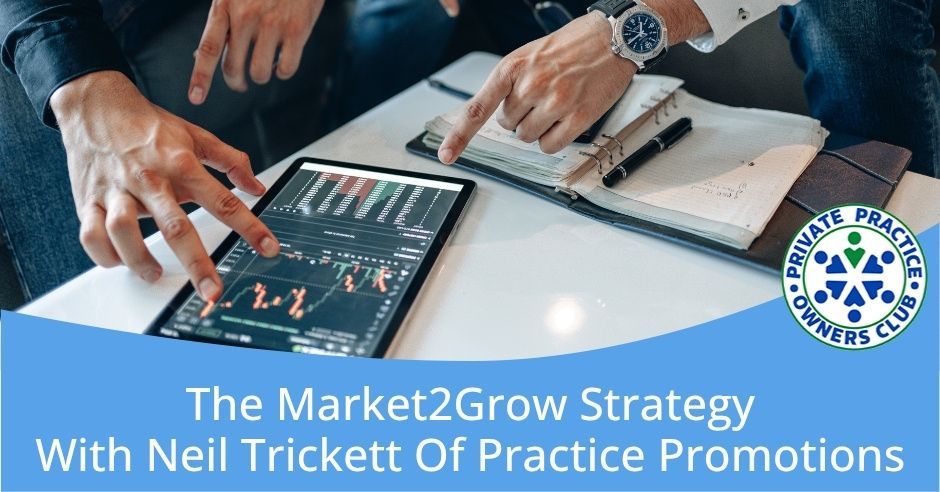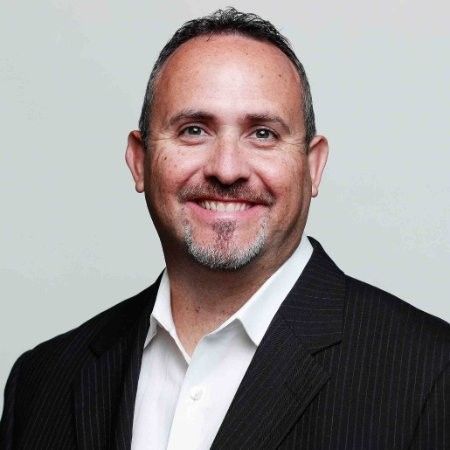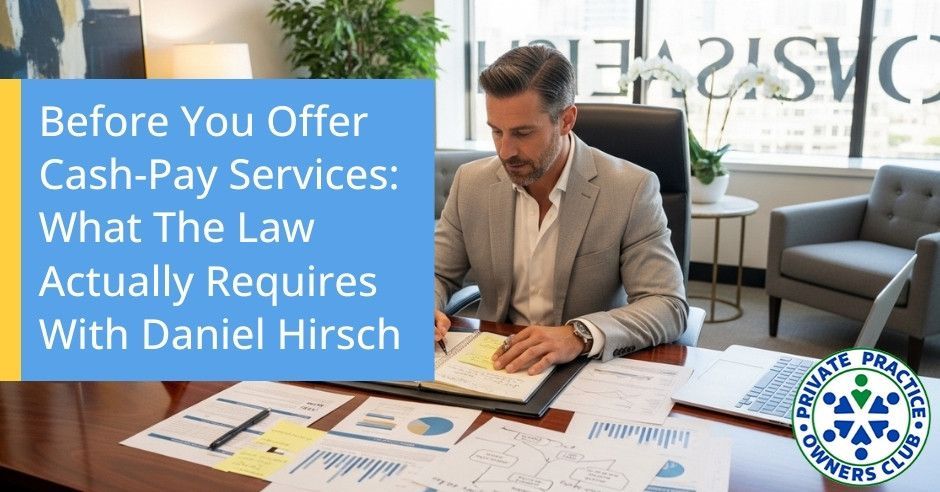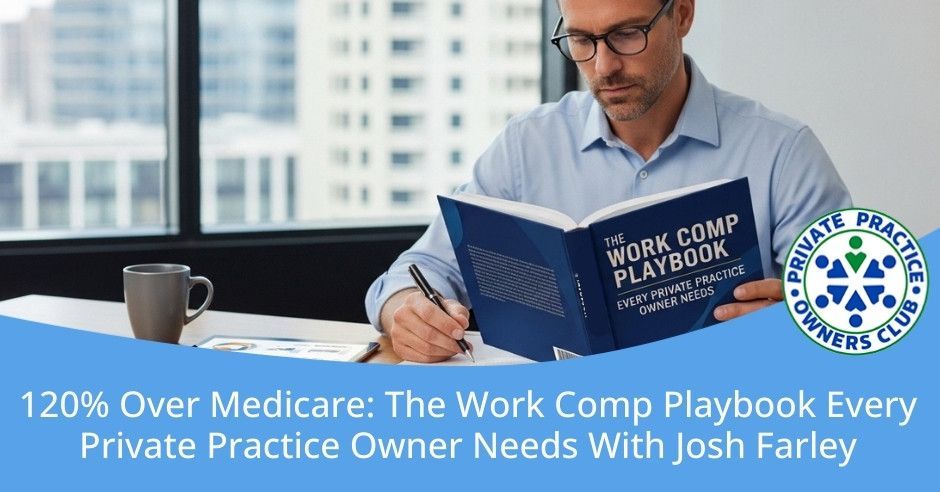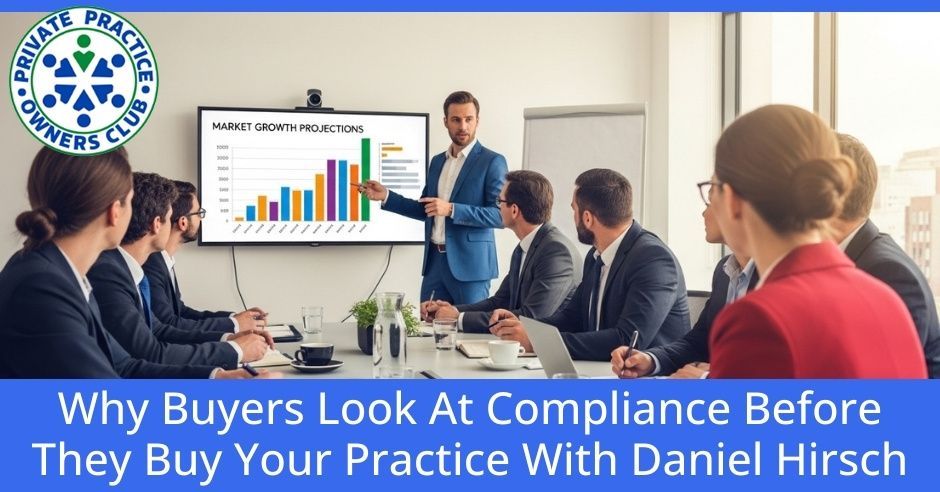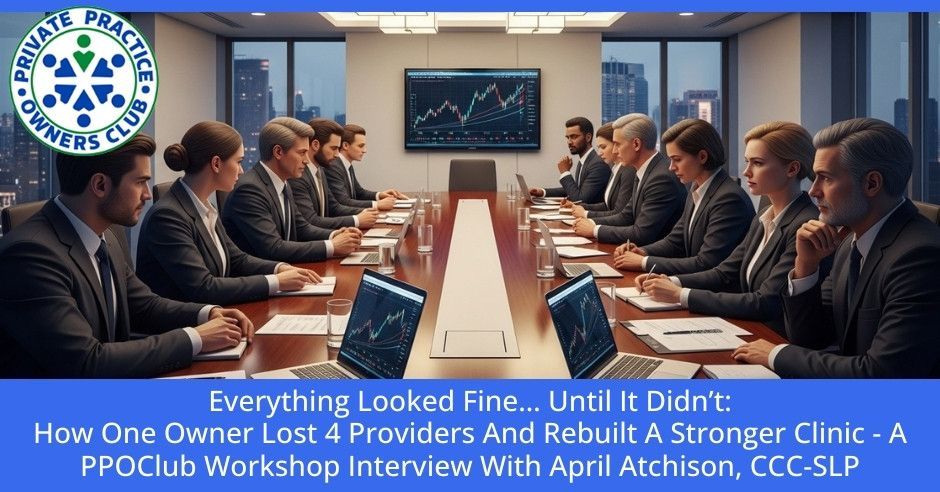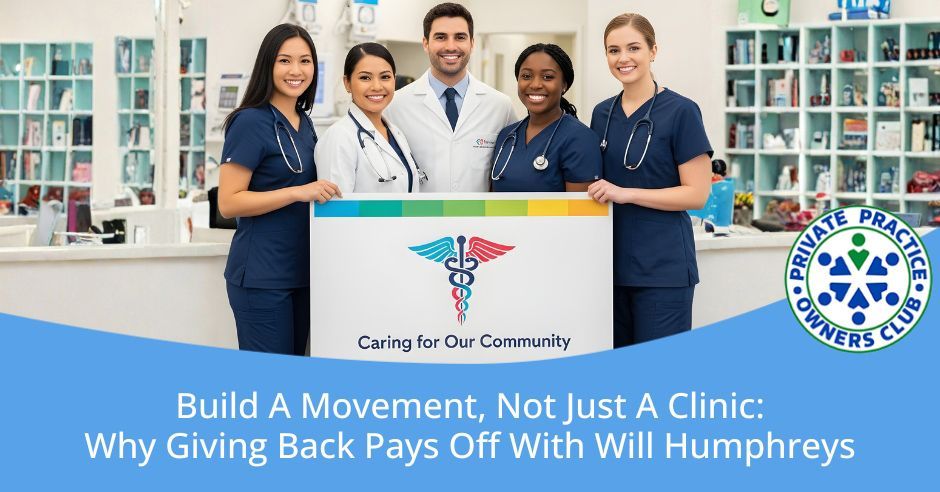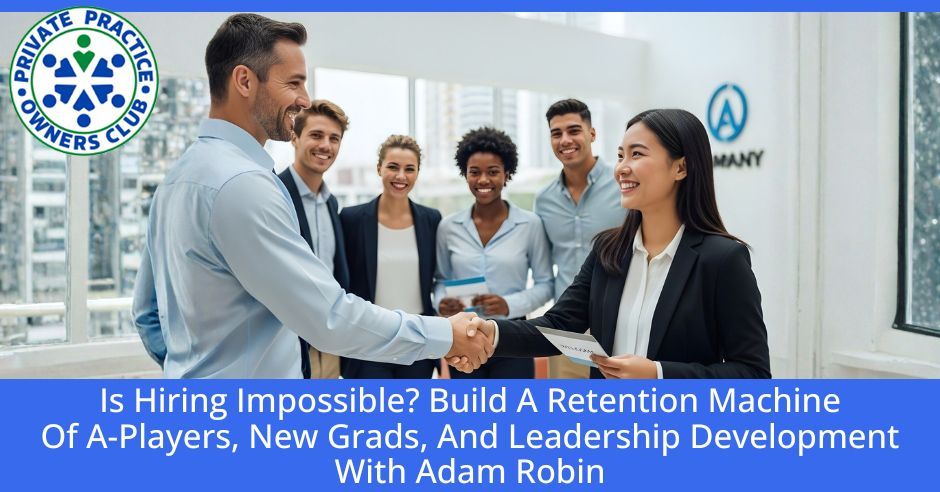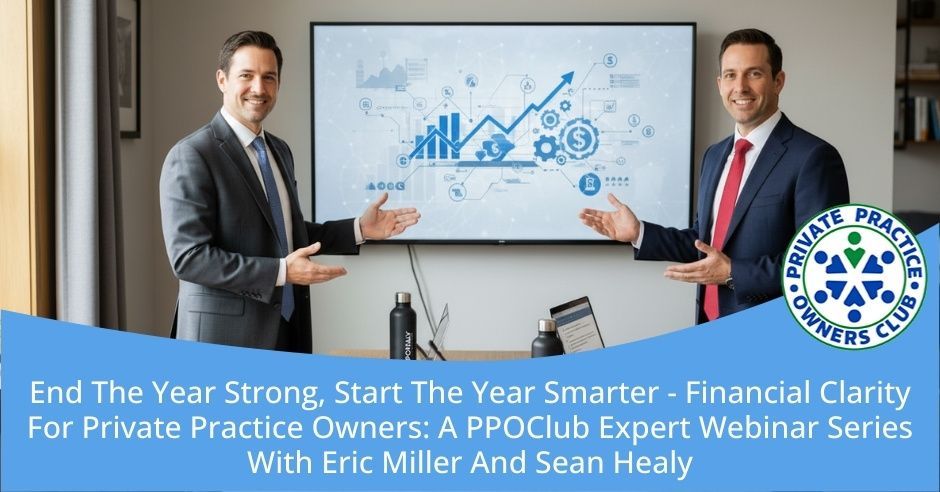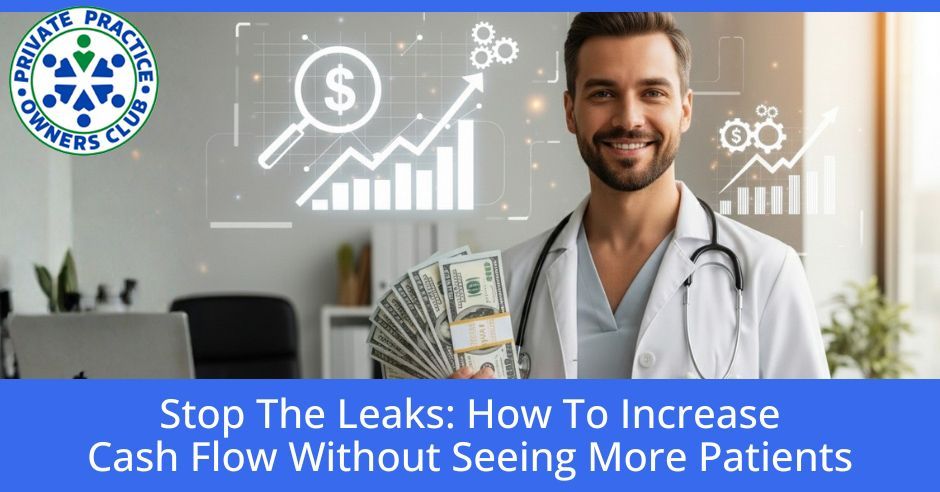Feeling stuck trying to grow your practice? Discover how smarter marketing can drive more patients, better hires, and bigger profits without sacrificing your time or freedom.
In this episode of the Private Practice Owners Club Podcast, Adam Robin welcomes Neil Trickett, CEO and Founder of Practice Promotions. With over two decades of experience as a PT, practice owner, and marketing expert, Neil shares the proven strategies that help clinics thrive in any market. Together, they explore how marketing isn’t just about getting patients, but about growing your entire business.
If you’re ready to expand your private practice without burning out, this is a conversation you don't want to miss.
𝗘𝗽𝗶𝘀𝗼𝗱𝗲 𝗛𝗶𝗴𝗵𝗹𝗶𝗴𝗵𝘁𝘀
• 𝗪𝗵𝘆 𝘆𝗼𝘂𝗿 𝗺𝗮𝗿𝗸𝗲𝘁𝗶𝗻𝗴 𝗺𝘂𝘀𝘁 𝗳𝗼𝗰𝘂𝘀 𝗱𝗶𝗿𝗲𝗰𝘁𝗹𝘆 𝗼𝗻 𝗰𝗼𝗻𝘀𝘂𝗺𝗲𝗿𝘀, not just physician referrals, to stay competitive.
• 𝗧𝗵𝗲 𝗚𝗿𝗼𝘄, 𝗛𝗶𝗿𝗲, 𝗮𝗻𝗱 𝗣𝗥𝗢𝗙𝗜𝗧 𝗺𝗮𝗿𝗸𝗲𝘁𝗶𝗻𝗴 𝗺𝗼𝗱𝗲𝗹 that high-performing practices follow to scale successfully.
• 𝗛𝗼𝘄 𝘁𝗼 𝗯𝘂𝗶𝗹𝗱 𝗮 𝗺𝗮𝗴𝗻𝗲𝘁𝗶𝗰 𝗲𝗺𝗽𝗹𝗼𝘆𝗲𝗿 𝗯𝗿𝗮𝗻𝗱 that attracts top clinical and administrative talent.
• 𝗪𝗵𝘆 𝗽𝗿𝗼𝗳𝗶𝘁-𝗱𝗿𝗶𝘃𝗲𝗻 𝗺𝗮𝗿𝗸𝗲𝘁𝗶𝗻𝗴 𝘀𝘁𝗿𝗮𝘁𝗲𝗴𝗶𝗲𝘀 𝗮𝗿𝗲 𝗲𝘀𝘀𝗲𝗻𝘁𝗶𝗮𝗹 to stop working harder and start earning more.
• 𝗧𝗵𝗲 𝗰𝗿𝗶𝘁𝗶𝗰𝗮𝗹 𝗺𝗶𝗻𝗱𝘀𝗲𝘁 𝘀𝗵𝗶𝗳𝘁 𝗳𝗿𝗼𝗺 𝗰𝗹𝗶𝗻𝗶𝗰𝗶𝗮𝗻 𝘁𝗼 𝗖𝗘𝗢 – and how to break free from being the bottleneck in your practice.
If you're ready to build a practice that grows consistently, hires top talent easily, and generates real profit – start today by learning from the best.
Tune in and transform how you market and lead your Private Practice!
👉 Visit our Linktree for our Coaching Services, Free KPI Dashboard, Facebook Group, and Annual Strategic Planning Services:https://go.ppoclub.com/linktree-podcasts
❤️ Love the show? Subscribe, rate, review, and share!https://ppoclub.com/
👉 Visithttps://bit.ly/Three-ProngedMarket2GrowSystem now and claim your free Market2Grow access
---
Listen to the Podcast here
The Market2Grow Strategy With Neil Trickett Of Practice Promotions
Welcome to the show. We're going to talk about everybody's favorite topic, marketing. I've got the guru of marketing. You guys have probably heard of him.
Private Practice Promotions
is the name of the company. Neil Trickett is the name of the CEO, founder, and owner. He's going to talk to us about how he helps clinics grow, hire, and make more profits through his program. Neil, how are you doing, man?
Good Adam, great to be on here. Great to be chatting with you again.
I've always been, I'm a fan of yours because I don't know a whole lot about you, but I'm learning more about you. What I'm really a fan of is just what you've been able to accomplish. You've been a PT for how long now?
We're going back some years since 1998.
You were a practice owner for a while. You want to tell us a little bit about that?
For about eight years, my wife and I owned a practice that we built up near West Palm Beach, Florida. Built that to almost a million-dollar practice and then exited that in 2010.
Incredible. That's not an easy thing, but not only that, you are crazy enough to be like, “I'm going to build something even bigger.” Now tell us about what you do.
Founding The Business To Fill A Marketing Gap
During that time, I just saw the need there. There wasn't much help for us at that time. We had to figure a lot of stuff out on our own, but there wasn't much support in the marketing world for physical therapy, rehabilitation clinics. I'm like, “There's an opportunity to help more clinics here and get the word out. What we do is a profession to the world. A rising tide floats all ships.
If we can help clinics do better at marketing themselves, then the profession does better as a whole. That was our mission from the get-go. Over the last fourteen years, we've just been blessed to work with a whole variety of different practice owners, everybody from startups to our largest client is a 160-location practice. It's really interesting to work with different types of clinics at different sizes because marketing needs change and they get more complex as they grow up.
We've been able to learn a lot through our own journey of business and marketing for practice promotions, and help our clients out with that too. Obviously, pivoting and innovating with all the changes in the world and how things happen there. We're fortunate now that we're at a size where we're a multi-seven-figure agency. We've got 78 staff that work with us. All kinds of specialists support our clients. That's been a journey for me, too, as an entrepreneur, to learn how to scale myself and scale the company to provide that level of service.
I want to get to like maybe the core of what you really do, and some of the new features that are coming out with your company. If it's okay, I want to pick your brain a little bit just about business in general.
Just do it.
Keys To Scaling A Business: People, Leadership, & Removing Bottlenecks
What you've built is amazing. I'd love to just hear if you zoom out, and this is me, maybe just asking a selfish question for myself. What do you feel like it really takes or like, what are your keys to success, if you will, to just growing a business?
You've got to keep learning. I'm always learning. You don't have all the answers. You never will. I think that's one part of being an entrepreneur is you're happiest when you're going trying to figure something out. I think what's looking back to what helps me be successful is surrounding myself with key people, like people that help me do things better that I can learn from. Always leaning on coaches, consultants.
I think the bigger that you get, the more people you work with just to help you in your journey. Having fantastic staff and learning the skills of attracting the right people to work with you and then also developing them as leaders, that helps take more off of your shoulders and the company can do more. We're always in the process of developing our people constantly. Trainings and especially then in people who want to be in leadership, who want to be directors or managers, and lead others.
You got to keep developing them. That's the only way to scale your business really. You cannot do it all by yourself. Where I see a lot of clinic owners make mistakes is that they keep trying to own everything. They become the bottleneck in their business. It happens at every level. It's not just like, “Once you get over being a startup and you have to wear all the hats, you've got to start hiring some people, obviously.”
Even as you become a multi-provided clinic, a multi-location clinic, and if you go bigger and bigger from there, you still get these bottleneck points. You realize that a lot of times it's you and you need to put the right department in the right person in place to help you go to that next level. That's some of the keys, I think, that have helped me grow our business to where it is.
It's cool to hear you say that because it's nothing that we haven't heard before, but it's like it's just more of getting a lot better at the basics.
It’s fundamental all the time.
Fundamental. I tell owners all the time. We have this epiphany, especially on coaching calls. We recognize that you lack of knowingness. The way that I said, was like is often the chin, the bottleneck. You just don't know enough. You're not studying. Your language was that you're not learning enough. You haven't learned enough yet.
I love whenever we get to debrief with our clients, and it's like, “Adam, I got a big win. I spent some time over the weekend, and I studied the vault, all the training you sent me. I dove into my numbers, and like we created our dashboard, and like I'm super clear.” I'm like, “Let's bottle that up. Let's debrief that experience.” Look what just happened. You decided to be the owner of that problem. Learn the thing and then look how empowered you are, and now you can take action.
The starting point is being the person. A lot of people don't even get out of this phase. If you're starting up your clinician, you're a biller, you're the owner, you're the mop on the floors, you're it. You hire some people who have front desk billers, you have more therapists on board. You have to realize where I see people get stuck is they have multiple providers and they're still treating full time and they haven't assumed that being this yet of being the CEO or being an entrepreneur and that you evolve and change over time towards that where you have to drive the vision of the company.
You have to be learning. You have to be looking at what is happening within the organization so that you can get everybody together and work on problem-solving there. You cannot do that if you're in the trenches all the time. That really is, again, the back to the bottleneck philosophy is that if that's the case and you're not being or assuming that beingness of being the CEO, you don't carve the time out for yourself. You make other things a priority.
I like the word identity. It's like you identify as the owner. I am an owner who happens to be a physical therapist or a speech therapist, or whatever you are. Once that transition happens, then you become the person that needs to do the thing. Your priorities shift a little bit.
You have to.
I don't know if you're a fan of Dan Martell, but he wrote a book called
Buy Back Your Time. I'm even wearing the blue shirt and the khakis. He says something. He says, “You build your people and they build the business.” That's what rang to me whenever you mentioned that people piece. I love how when you see that owner transition to not only the builder of the business, but the builder of the people, you see. That's like another level that they hit on that journey.
I say to you, I've made so many mistakes in hiring along the way, and just got to realize like, “That's okay. You're going to mess up. You're going to hire the wrong people.” As long as you identify it, and then it's having the courage to move on. They're going to find something better that fits them. You're going to find someone that fits your practice better, too. We all have it where we hold onto people way too long, and that affects the business. In order to have the right people to build the system, to build the practice, I find that every time we go through changes in staff, we level up. We find better people. Now you realize, like, the bar has been set a little bit.
The bar is raised.
It's okay. If you have that in your practice, if you've been through that, don't get beat up on it because it's part of business, and being able to fail is part of business, and being able to fail with people is part of business. You just learn from your mistake,s and then you find the next right person.
Letting Go With Supervision & Accountability
Love it. Having the courage is what I wrote down for everyone. I want to hit on this last bullet point before we jump into the marketing. Letting go. I wrote down letting go. I think you mentioned you're the bottleneck. You should be delegating. I don't remember exactly the terminology that you or we hold onto things a little too long, I think, is based.
You don't have all the answers. You never will. You've got to keep learning.
That's a great phrase that you brought up is let it go, because that's one of the things that I say too, is we hear that a lot in business trainings and things that we see around business. We hear that you've got to delegate, you got to let it go in order to climb the business. Where I see errors happen is that we let it go, but without supervision. I will say, “Let it go with supervision.” As the owner of the business, you should have a great pulse on what's happening within the business, but have confidence and trust in your team to handle little nuances and things like that.
They don't have to tell you every single little thing, but if they're really good about flowing up the information to you, you feel comfortable in knowing that things are being handled the way that they're being handled. Sometimes we just let like, “I've got a great person here. They're just going to run it, and I don't need to know anything about it.” All of a sudden, they make mistakes or errors, and it becomes a problem.
I've been fortunate enough to not run into that issue yet personally, but I did hire Nathan pretty early in my career. I got lucky, but I do run into owners who I coach that have that issue. They've got that key player that they thought has been doing a good job, but then when they start working with us, they're like, “We start pulling back the curtain.
We all need someone to report to. Even your manager, director, and your key person need somebody. That person is you, as the owner of the business. As an owner of a business, you should have a coach or a consultant that's your person to go to, or other mentors. That's something like you always need someone to report to.
I wrote down letting go with accountability. I have that accountability. Get quicker at recognizing when it's time to let go. You don't have to wait until your head's about to pop off or you let it go. Like, play offense instead of playing defense. Get out in front of it. You can be offensive with your growth and not reactive. Let's talk about marketing. Marketing to grow strategy is your key strategy, and the bullet points are grow, hire, and profit. I'd love to dive into those, and can you want to just tell us about what that is, and maybe you can try to take it away from there.
Last year, I spent some time consolidating what we've seen clinics do well and what we've done for clinics basically over the last ten years. What did the top ten percent of clinics do well that sets them apart, that allows them to have massive growth? We work with some clinics that are just doing fantastic despite whatever the economy is throwing at them. There's a reason for that. What I did was I consolidated that knowledge there that research into a strategy.
What we do with that is compartmentalize into three key areas that move the levers in your business. First off is grow. You've got to market to grow your business. How do you use marketing to grow your practice? That means, how are you attracting new patients? How are you leveraging your customer lists? How are you making sure that you get the most bang for your buck through all of that? Market to hire.
We know that we're in a very competitive market for talent, and we have shortages in therapists. We have shortages in admins to have two in some areas. How you position and brand yourself in marketing, just like we do for new patients, we need to apply that to how we're attracting top talent to come work for us. Lastly is profit here. We can push a lot of patients into our practice, but is it going to be the patients that we're going to get paid well for.
We got to know our worth in practice so that we know our worth. know what we need to be making in order to have the profitability there in order to achieve further goals, compensate our staff well, and retain the top talent that we're attracting. You busted your butt for years to be a clinic owner so you should be compensated very well for that and making sure that you have the right profit ratios for yourself. How do you leverage marketing to attract higher-paying patients?
How do you make sure that you're getting the most bang for your buck with good tracking and capabilities there? How are you able to add additional cash value service lines to your practice and market does. That's the market to profit side of it there. We've got key things within each one of those that we'll dive into here with a chat about here. If you can tackle each one of those key areas of your practice, it handles a lot of growth and it handles a lot of problems that you constantly face. Grow, hire, and profit.
I haven't run into a clinic owner who's got a lot of patients on their schedule and money in the bank, and people to hire that has a lot of problems. They're usually doing pretty good. I love that. If you're cool with it, we can just jump into grow.
Yeah, it’s good.
Growing Your Practice In The Digital Age
I'd love to hear, maybe like, what are some of the things that the audience needs to know about those specifics? Maybe what's new? Like it's 2025, things are changing, there's AI and stuff like what's new in that world that you feel like people need to know?
The only constant is change. Let's dive into the grow part here. What can you do to grow the number of new patients or a number of patients in your practice? It's very easy to go jumping off in all kinds of directions for the shiny objects that we see in today's world. Maybe I should try Facebook advertising over here. I saw a new AI thing over here. We can get distracted and start to chase things that may not necessarily be the best fit for our practice.
What we want to look at first is what the underlying strategy is, and what we are trying to achieve here. First off, it's about in today's world, things have changed so much in how we get new patients in the door. We have more, I would say, cynical patients than ever before because there's so much more information and false information out there. You have to cut through the noise and build that trust on your online presence before they ever even come into your clinic.
Back in the day, we just relied a lot on word of mouth and physician referrals. That's changed a lot over the years. In today's world, we have to be very direct to consumers in terms of our marketing. Yes, you can still build great physician networks and physician relationships. That's still a key part of our practice. We should spend a lot of time building our word of mouth and our relationships with our patients, both current and past, but how are we showing up in the digital space?
How are we showing up in that world in our community so that we can get in front of people that are the low-hanging fruit are the ones that are searching for physical therapists near me. The others are just searching for how I can help my back, or I sprained my knee. What should I do? They may have heard a PT, but they don't even know why they would go see a PT. We get to get in front of those people in terms of the way that they're searching online and trying to get help.
Just to break it down real easy, is that as a strategy, think about first, like what can I do to level up my direct-to-consumer marketing? Through that, we want to look at how can we build our online discoverability. How are we showing up in our community for all those thousands and thousands of searches that are being done each month for help? There's a lot that we can do around that.
Secondly, as people interact with us, are we building their confidence with us and improving the conversions through our website, which is one of our main gateways to people coming into our practice? A website conversion is basically someone who visits it and then actually either calls or books an appointment through your website. Thirdly is how are we leveraging our gold mining in our practice, which is our customer list and all the patients that we've served, so that we can continue into the future with getting more referrals from those people that we service, getting them back for care.
Maybe there are opportunities there for keeping servicing them with subscription programs or whatever we may be able to do in our clinic. That whole retention, referral, and reactivation model for patient marketing. Those are the three core areas underneath that grow if we focus on, we can make some big improvements in our number of new patients. Marketing is our throttle to our business. If we want to grow our business, we need to have a good marketing system.
The larger your practice becomes, the more complex your marketing systems need to be, and the more data and tracking you need to have. Just realize that what got you here isn't necessarily going to get you there. From an online discoverability standpoint, the key thing to work on first before you go off jumping into Facebook advertising and all these other things is really where most people go to search, like 70-something percent of people will search for a healthcare provider before they ever go to them.
Google is the primary place for that. We need to make sure that we're showing up good for Google searches for physical therapy near me, but also sciatica, back pain, knee pain, all these other searches, how can we rank our practice well there? There are a lot of different tools that we can use for that. Part of it is your website, but there are also a lot of other things that you can do online. A really simple thing that we can do as practice owners is level up our Google profiles.
That's going to help you show up better in the map section. As people check out your stuff there, they're going to trust you more. They're going to want to call you more. Simple things you can do there are just to make sure you have really good pictures on your Google profile. It's very easy to upload. Make sure that you're getting consistent reviews. People are going to check out your views. That's going to help you rank somewhat. There are opportunities on there to answer common questions. You can put your own questions in there and answer them.
Like, what should I expect? All these different questions may be there. The more you have that, the better Google will like you. Also, categories within our profile, very easy to add categories. Maybe you have sports medicine in there, you have a sports performance program, or you have a massage program, whatever, maybe you can show up for all kinds of other categories in that. If you're doing blogs or you have other things that you're putting out there, you can post that up into your Google profile, too.
There's a lot that you can do just within your Google profile to help you show up better. From a patient behavior point of view, it's not just about ranking at the very top of Google. It's about how many spots you have on page one of Google, because you want to be showing up at the top, which is the ads section. The ads you can show up at the top as well as the top of the maps section in searches. You want to show up in the map session, which is your local SEO, and then also in the top ten section.
Theoretically, you can have four spots on page one of Google if you're doing all these things. If you're a patient and you type in for physical therapists near me, you see this clinic, with there are four times you're thinking this must be the best place. I'm going to click on them. You have a much higher probability of gaining that segment of people to you. They're going to come into your practice. Of course, there are other things that you would do around online discoverability, whether building your social profile, people would check you out.
Making sure that you also update not just your Google profile, but also Apple Maps, Apple Business Profile, is free too. Make sure you have a good Apple profile. Also, Bing is used in ChatGPT and all these other places. Making sure that you have that updated. It's not like super complicated for those things. It just takes a little setup and some monitoring, but you can do a lot just with that yourself. The whole underlying thing is, how are you showing up in your communities for that online discoverability?
Consistency In Online Presence & Trust Building
You want to be consistent. Is the word that comes to mind? I don't know, maybe that's not the right word, but consistently present. There's something about consistency, and it's one of the mantras that I promote when we were talking about marketing in our program. Consistency is the first thing.
It's like, you want people who are, if they have knee pain and they're looking online, whether it's on Facebook, Google, Bing, anywhere, if they spend 3 or 4 days in a row researching what knee pain is, you want to be consistently available for them. No matter where they go. The people who are consistent naturally start to cultivate trust on the other end because I can trust these people, and they show up regularly. Let me click, boom. Now we go into the conversion phase of things.
You're increasing your probability, too. It's like, how many times at bat do you have with the person? The more times at bat, the more the probability you're going to knock it out into the park. You need to just, like you said, be consistent, show up. That's where having the presence for it is key. Now, can you do all that by yourself? Probably not. Again, we want to start to delegate some of these things, work with an outside agency that can help you show up, who knows the technicalities and the nuances of stuff.
You can be part of the strategy. What are your needs, specific nuances, and needs of your practice? That's where, like, your role comes into play, but definitely leverage people who know what they're doing in that space. That's your like, getting discovered more online. Secondly, we got to use our website more as what it is, our digital storefront. It's how people will make that decision of, am I going to make the go-ahead to come into this place or not?
The larger your practice becomes, the more complex your marketing systems need to be, and the more data and tracking you need to have.
Does it smell nice in there?
Website Conversion Optimization
Does it look and smell nice? I love it. Website conversions is a big thing and it's an area that people don't put much attention on, but it can make a huge difference in your practice. I'll give you an example here. Let's just say you're doing very well from an online discoverability standpoint, and you actually get 1,000 people visiting your website a month, which is not unheard of in an urban area.
Let's say a thousand people come to visit your website a month and find you. Out of those thousand people, you get about a 2% conversion, which is pretty normal, like an industry standard for the amount of people that convert on your website. Meaning that they are going to call or book an appointment through your website, but that gives you about twenty new leads a month from your website as a 2% conversion.
Now, if your website is better at converting and you're able to go up just 2% in your conversions, that's double the number of new patients. You went from 2% to 4%. Now you've gone from 20 new leads a month to 40 new leads a month. That's a massive difference in revenue to your practice and the people that you can treat. Website conversions are a key area that we look at a lot at and how we can help clinics do better.
Our average conversion is around 8.2%. That's a massive difference compared to what people start. Now, what makes that happen? There's a lot that goes in. You've got to be what I call patient-centric. You're really talking and speaking to the patient's problems, not just how good you are as a clinic, and also condition-centric. Are you speaking to their particular pain or problem? If I have a page that I'm talking about knee pain, and I've got knee pain, I think of you as more of the expert.
We want to have a lot more content within our website. That's specific by conditions because that will rank in Google and people will get much more connected with you in that regard. There are also other things that you would again rely on someone who has a specialty in building websites. For example, like we use AI software, our designers do this that mimics eye tracking. It helps the designer design the website in a way that maximizes how easy it is for someone to search around the website with their eyes.
We've also got other tools like heat maps, which track people's behavior on your website. You can see, “Are they scrolling past a certain section, or are they dropping off? Are they clicking on certain things or are they're not?” You can either change layouts, you can change how people click on different buttons. If you have those tools, you can get better conversion rates, which means more people in the clinic without even having to increase the number of people visiting your website. That's the conversion side of it.
I like how that works. I'm sure you're familiar with Alex Hormozi. You know that guy? I don't know if you've read his book. I'm sure you have a hundred-million-dollar lead. It's back there. He says, “All things remain equal. If you increase the leads in your business, you'll make more money.” It's like you said, you double the amount of the lead flow to your practice. You're to have more new patients. You're able to hire more people and make more money, and grow your business.
The one caveat that I'm saying with this is because that it comes back into the online discoverability part. The conversion part is key too, because that's like your offers. A hundred-million-dollar offer that he wrote.
I was going to say it's a weird piece because it's a lead, but there's also there's a conversion piece there too.
There are steps to that conversion. We want to get a person to call us or fill out the form on our website. There is our front desk, and call them back. That's the conversion that we're looking for there. Are they excited enough where they're going to commit to go through with it? Usually, what you'll find is someone coming in from Google is doing their research, looking at reviews, or all this stuff.
They're checking out your website, really digging in there, and they're like, “I'm going to call this place or I'm going to fill out the form to get going.” Your interest level is much higher for that type of person. If I'm spending a lot of money on Facebook leads without much of a program there or just trying to throw people at my website. You can generate a tremendous amount of volume with people on it, but we're on Facebook for entertainment and cat videos, and all kinds of other stuff.
You'll get people that come there, and this looks good, interesting, but I'm onto something else. I'm back to entertainment. You want to make sure that you're trying to work in the areas that are going to help you get the most conversions for that. That's again why we want to put some effort into not just having a pretty website, but one that actually functions and really works.
It works. It's like having your own employee that works 24/7. I love it.
Part of also that conversion is the sales process, which is at the front desk. We got someone delivered as a lead to the front desk, but did they call them back? Did they leave it on hold? Did they not even answer the phone? Are they very good on the phone at being able to inquire and their person asking what insurance do you take? We have to have a good sales process and training at our front desk to make sure that the lead actually then turns into an eval on our books.
Proactive Recruiting Strategy Using Website & SEO
I'm super interested in hearing about how you help owners hire because that is a big pain point for people. I love recruiting. It's like one of my favorite things to do. I'm very interested. Help me understand how that works. How do you guys help people hire and recruit therapists?
If you elevate your brand and your position in the market, you're going to attract people with more disposable income.
Sure, absolutely. Let's think about how we normally go about recruiting. We're like we've got a notice from one of our therapists that they're leaving in two weeks. “No, I've got to go get hiring here immediately. I'm going to throw some ads up on Indeed, maybe ZipRecruiter, and I'm going to twiddle my thumbs and wait, or I might post something up on Facebook or just start asking around if anybody wants to come work for me.”
I'm behind the eight ball already on that. We want to have more, especially in today's market, to have a more proactive stance in how we're constantly hiring and constantly recruiting. A lot of that we can do passively, and the thing that we need to shift our mindset is how we are attracting the right people to come work for us. The right people that you want to have are the people who are already working somewhere else, but are just not completely satisfied.
They're starting to browse a little bit. Where do we typically start to browse? When we start to browse on Google. They start to look at the other clinics around them and just see what they look like. Do I like the look of the people or the place? You get your browsers out there, and that's probably 90% of the market. What you don't want is someone who has just let go and is now on Indeed. I want to go start interviewing because they were let go for a reason, often.
We want to find the right people, but we have to attract them to us. We've got to have that nice shiny lure that we start to put in the water and pick their interest to come check us out. We want to use that approach, that philosophy. The good news is there is whatever we're doing with our marketing and we're elevating our brand, we're elevating our position there in the community, through our websites, through our social media, through our digital presence, like that naturally starts to attract more people.
The next step is to take some time and start with building out the careers area of your website. You should have quite a lengthy page here where it's an opportunity to showcase your culture, your programs, and speak to that person. What is going to help them want to stay with you and build a career with you? You might have mentorship programs that you have in place, residency programs, whatever you may have. Are you portraying that within your website? We help clinics build out their careers page for that.
It's a great place to feature all kinds of fun photos and activities, all the things that you do together as a team. That's a great place to showcase that and what it's like to work there. Of course, all the opportunities that you have. As part of that, you can also have a section that's all about students. Ideally, you want to be having an internship program constantly rolling in your practice where you can pull from top schools around you. I guess where a lot of their teachers or professors are going to or whoever's coordinating those internship programs, they're going to go on your website.
If you go to Google, they can find it there.
If you have a section dedicated to how you support the school and how you support the students, and what they're going to learn there, and have visuals and all that great stuff. You can build an awesome internship program in your practice that you can then leverage with schools around you, and have a constant stream of interns there. It's another opportunity within your career page. The other thing that we've developed is putting a recruitment center within the careers page.
When you go on those browsers that we were talking about. The people that are currently working and start to browse around, they're going to go on Google. They're going to type in like physical therapy jobs near me or physical therapy clinics. If you type in anything with jobs or careers in it, Google switches from its normal search to Google for Jobs. What you'll see up there is everything related to job positions in your area.
What you'll notice is that all the Indeed ads and all the ZipRecruiter ads, and the Snagajob, and all these job boards are pulling up into Google for jobs. If you are paying Indeed for extra ads or boosting, they're doing Google ads for you for that. Indeed is using Google, and ZipRecruiter is using Google. Why aren't you using Google to do recruiting? That's what we've done for clinics is build job posts within their website that are then picked up by SEO rather quickly.
That outranks Indeed and ZipRecruiter for some of those top spots. Now, if I'm typing for physical therapy jobs near me, I'm going to see your job post on your website up there. If I click on it, you pull all the data in. What it's like to work there, and maybe your benefits, salary ranges, whatever you have, but I click on it. I go to the website.
I don't go off to Indeed, where it's just text and I'm everybody else. I've got a captive audience, and I got an opportunity here to then showcase what it's like to work. As we've done this, what we've heard back from our clients is that they're getting much higher-quality candidates come through, and it may not be as big of a volume, but the quality is much higher. An example is that we have a ten-location clinic we're working with in Massachusetts, and they were our test client for two months, with we ran this program with them.
They were able to hire with all their other efforts to seventeen total staff. Office managers, PTs, PTAs, you name it. Nine of those came from the Google process. They just show you, like, if you're really approaching this from a different angle and realizing that you now have to market to get top talent, the ones that do that are going to be commanding more of the available therapists in the market. It's a fight for talent these days.
I like how you mentioned those browsers because they're all there. It's common and I'm guilty of it too, for us to get into that scarcity mindset when it comes to recruiting. There are only so many therapists. I live in South Mississippi. There's only like five of us here. That's true, but what you don't account for is how often there are these transitions or these browsers who are looking for something new. Maybe they're transitioning, they're moving across town, and that happens a lot more often than you think.
I just had a conversation with a PT candidate this past week, and she's like, “We've been connected for two years.” She's like, “I'm going to be moving right next to one of your locations and I'm going to be looking for a new leadership position.” I'm like, “That's amazing.” I love that you made that distinction. The people who were in that transition and browsing and having a good website like that are a really powerful tool.
You also have capabilities, as you can use Google Ads and Google Ads, you can actually target wherever you want. What's really good with that is you can target other towns or cities. You can target universities to show up for physical therapy jobs. You have physical therapy job type campaigns, whether it's going to be a PT job or an office manager or whatever you need, you can use Google ads for that.
That's a nice thing. If you're like a more rural clinic, let's say we have some clients up in Alaska, like I know Nathan's been up in Alaska, too. There aren't many PT schools in Alaska. You've got to go down in the downtown States and go from there, but you can use Google ads to do that. Wouldn't it be awesome if you're in Alaska and you're to have a Google ad campaign for PTs in Phoenix when it's murderously hot in July.
That’s so cool.
You'll get some clicks to your careers page. You can show that. What I would suggest for people in rural areas is sell also not just the benefits of what it's like to work for you, but you're going to put some time in also an additional page of what it's like to live there. You could sell the outdoor lifestyle. You're going to find people who want to have that outdoor lifestyle. That's what's going to attract them to come and move where you are. That's just another suggestion there.
Marketing To Attract Higher-Paying Patients & Profit Growth
Real quick profits. I like making money. I'm sure people that are reading this want to make money too. How do we play offense and attract higher payers or more higher value customers into the practice?
Again, this is where marketing comes into play. If you elevate your brand, if you elevate your position in the market, you're going to attract people who have more disposable income. You're going to attack people who are more into health and wellness. That will allow you to attract people with higher paying insurances, as well as people that are willing to pay out of network, or you will go see that cancer doctor across the country if you have that specific cancer and they're the experts in that particular thing.
People do that all the time. You have to position yourself as the go-to expert in your niche and brand yourself around that, and elevate your marketing that way. Some simple things you can do, too, is actually call out your best insurances on your website. The logo's up there. Take your top three best reimbursing insurances and throw that right up on your website. You'll be surprised at how many will start to come towards you with just those. The other part of it is that you should be in today's world, I think the direction of our profession is going to be in a hybrid insurance model.
We'll have core insurance, we'll then start to add on cash services. We just see this more and more, and I think it's the direction we need to go. It gives us more command, and there are a lot of people willing to pay out of pocket for good service and good help. You should be thinking about how I can add different lines of service to my practice. Whether that's a new fit or a laser, or a sports performance program, or anything, you can make a little bit of a subscription model.
Shockwave is a big one, too.
There are all kinds of things you could be adding into your practice that are cash value add services, but you have to market them. What's cool about that is gives you a position in your market that allows you to be different. You can leverage that in your marketing again to attract people who are willing to pay cash out of pocket. We see some cool, especially like sports performance clinics that have that edgy, really cutting-edge look. They're filling their practice well. We've got to look for opportunities like that, but that's how we leverage marketing to profit.
A lot of super cool things are happening. For those that are reading, Neil is the guy. He's been there, done that. He's been a successful practice owner. He's built a huge online company. He's top-notch in what he does. Neil, if they want to get in touch with you, like if they want to hear more about what you do or how you might be able to help them, how do they do that?
First off, you can just go to
PracticePromotions.net. We've got tons of resources on there for you to get great ideas about how to market your practice. Check that out. If you want to get our market to grow, book with the whole strategy that we've been talking about here, just go to
Market2Grow.net. It's
Market2Grow.net, and you can just get our free book shipped to you along with our market. We've got a great marketing calendar in there and some other cool marketing stuff in that kit. That's a great opportunity for practice owners to understand the strategy and how they can leverage it in their business.
If you're still listening, go to the show notes. I'll drop that in the show notes as well. You guys can check that out. Neil, I appreciate the time. Let's circle back and maybe Q4, and you can fill us in on what's new then.
You got it. Thanks, Adam.
Be good.
Important Links
About Neil Trickett


